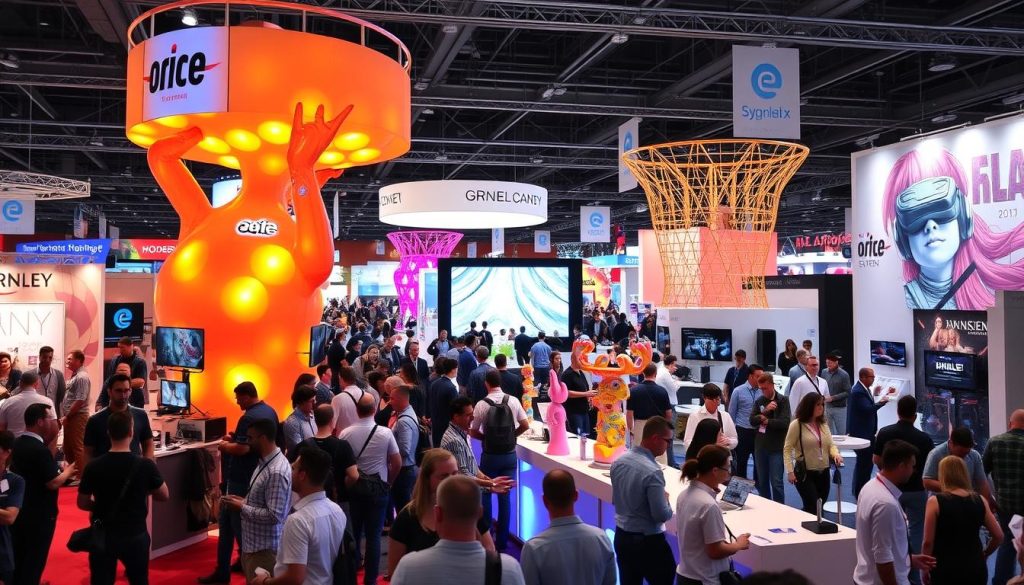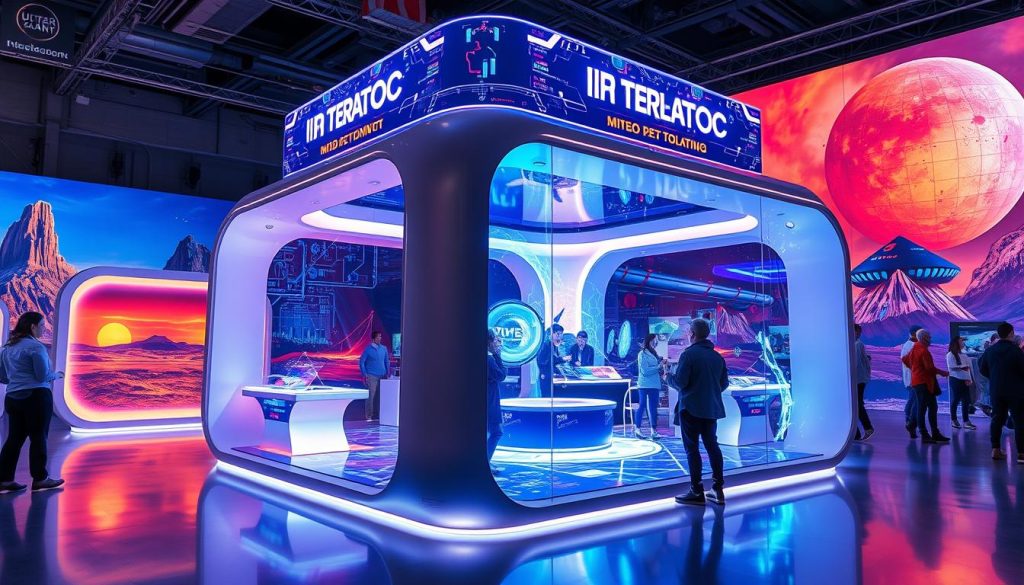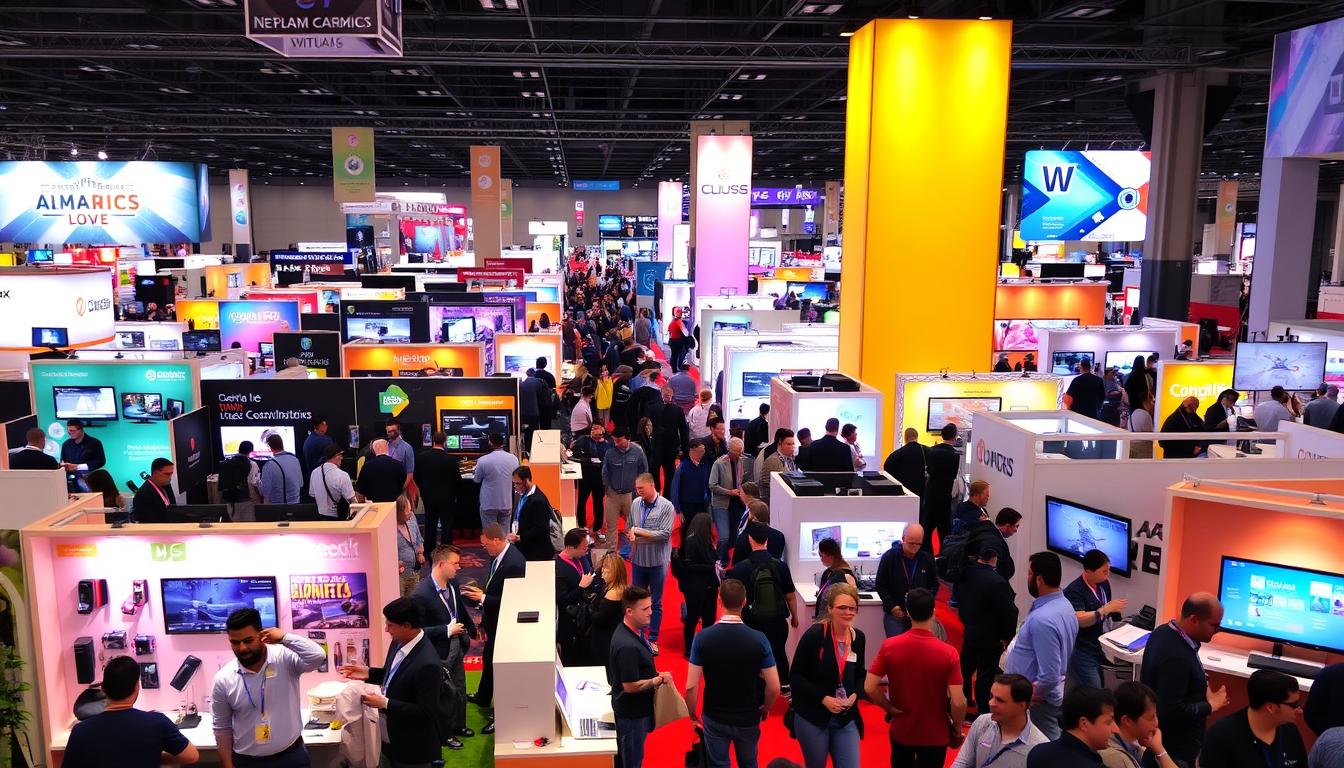Trade show marketing has come a long way from the days of handing out pens and stress balls. Today’s expo visitors crave more than just trinkets; they seek meaningful experiences and valuable connections. This shift in expectations has sparked a revolution in visitor engagement tactics, pushing exhibitors to think outside the box.
The modern trade show landscape demands a fresh approach. Savvy marketers are now focusing on creating immersive brand experiences that captivate attendees and leave lasting impressions. By embracing innovative strategies beyond freebies, companies can stand out in the crowded expo hall and forge genuine connections with potential clients.
Key Takeaways
- Shift focus from freebies to meaningful experiences
- Create immersive brand interactions
- Utilize technology for enhanced engagement
- Develop personalized visitor experiences
- Implement data-driven engagement strategies
- Foster long-term relationships through valuable interactions
Understanding Modern Trade Show Dynamics
Trade show marketing has transformed dramatically in recent years. Gone are the days of simple booth setups and product displays. Today’s exhibitors face a new landscape shaped by changing visitor expectations and evolving industry trends.
Shifting Visitor Expectations
Modern trade show attendees crave more than just information. They seek immersive experiences that engage their senses and emotions. This shift has pushed exhibitors to reimagine their approach to event activation, focusing on creating memorable interactions that resonate long after the show ends.
The Evolution of Exhibition Marketing
Exhibition marketing has evolved from passive displays to active engagement strategies. Companies now prioritize experiential marketing techniques that allow visitors to interact with products and services firsthand. This hands-on approach helps build stronger connections between brands and potential customers.
Current Industry Trends
Several trends are shaping the future of trade show marketing:
- Technology integration: Virtual and augmented reality experiences are becoming commonplace
- Sustainability: Eco-friendly booth designs and materials are gaining popularity
- Personalization: Tailored experiences based on visitor data and preferences
- Social media integration: Leveraging digital platforms to extend reach beyond the physical event
By embracing these trends, exhibitors can create more effective and engaging trade show experiences that drive results and foster lasting relationships with attendees.
Interactive Booth Design Principles
Crafting an engaging trade show booth goes beyond aesthetics. It’s about creating a space that draws visitors in and leaves a lasting impression. Interactive Booth Design principles focus on blending form with function to boost brand awareness and drive sales.
A well-designed booth layout encourages natural flow and exploration. Use open spaces to prevent congestion and create zones for different activities. This approach allows visitors to move freely and engage with your brand at their own pace.
Incorporate technology to elevate the visitor experience. Touch screens, virtual reality, and augmented reality can transform your booth into an immersive environment. These tools not only captivate attention but also provide valuable data on visitor interests.
Brand Immersion Techniques play a crucial role in booth design. Use consistent colors, logos, and messaging throughout your space to reinforce brand identity. Consider these elements:
- Interactive product demonstrations
- Personalized experiences
- Gamification elements
- Social media integration
Remember, the goal is to create memorable experiences that align with your brand message. By focusing on interaction and engagement, you’ll stand out from the crowd and make a lasting impact on trade show attendees.
Creating Immersive Brand Experiences
Brand Immersion Techniques have become crucial for companies looking to stand out at expos. These strategies go beyond traditional marketing, aiming to create Memorable Visitor Experiences that leave a lasting impact.
Sensory Marketing Techniques
Engaging multiple senses can significantly enhance brand recall. Scents, sounds, and textures can transport visitors into a brand’s world. For example, a coffee company might use the aroma of freshly brewed coffee to draw attendees in.
Storytelling Through Design
Effective booth design tells a brand’s story without words. Use colors, shapes, and layouts that reflect your brand identity. Create a journey for visitors as they move through your space, revealing your brand narrative step by step.
Technology Integration
Modern tech can elevate brand experiences to new heights. Virtual reality tours, interactive touchscreens, and personalized mobile interactions can make your booth unforgettable. Innovative communication tools can also enhance follow-ups after the event.
| Immersion Element | Impact on Visitor Experience | Example |
|---|---|---|
| Sensory Marketing | Increases emotional connection | Scented booth for a perfume brand |
| Storytelling Design | Improves brand understanding | Historical timeline wall for a heritage brand |
| Technology Integration | Boosts engagement and interactivity | VR product demonstrations |
By combining these elements, brands can craft Memorable Visitor Experiences that resonate long after the expo ends. The key is to create a cohesive, immersive environment that speaks to your brand’s unique identity and values.
Experiential Marketing Strategies
Experiential marketing has revolutionized trade show engagement. This approach transforms passive observers into active participants, creating lasting brand impressions. At its core, experiential marketing aims to forge emotional connections between visitors and brands through immersive experiences.

Event activation techniques play a crucial role in bringing experiential marketing to life. These may include interactive product demonstrations, virtual reality simulations, or hands-on workshops. By allowing visitors to interact directly with products or services, brands can create memorable experiences that resonate long after the event ends.
Effective visitor engagement tactics go beyond traditional booth setups. Consider these innovative approaches:
- Gamification elements that challenge and reward participation
- Live performances or product reveals to create buzz
- Personalized consultations or product fittings
- Photo booths with branded props for shareable moments
The key to successful experiential marketing lies in understanding your audience and crafting experiences that align with their interests and needs. This approach not only attracts visitors but also generates quality leads and fosters lasting relationships.
| Strategy | Benefits | Examples |
|---|---|---|
| Interactive Demos | Hands-on product experience | Virtual product customization |
| Sensory Marketing | Multi-sensory brand engagement | Scent-infused booths, texture walls |
| Social Media Integration | Extended reach, user-generated content | Live tweet walls, Instagram-worthy setups |
By implementing these experiential marketing strategies, brands can create impactful trade show presences that captivate audiences and drive meaningful engagement.
Engaging Expo Visitors: Strategies Beyond Freebies
Trade show success hinges on visitor engagement. While freebies attract attention, they don’t guarantee meaningful connections. Let’s explore innovative strategies beyond freebies to captivate expo attendees and drive lead generation.
Value-Based Engagement Methods
Deliver real value to visitors. Offer personalized consultations or product demos tailored to each attendee’s needs. This approach showcases your expertise and helps build trust, much like successful ABA agencies build relationships with.
Personal Connection Techniques
Foster genuine interactions. Train your booth staff to listen actively and ask insightful questions. Create a welcoming atmosphere that encourages visitors to share their challenges, allowing you to present targeted solutions.
Educational Content Delivery
Position your brand as an industry leader by sharing valuable insights. Host mini-workshops or interactive presentations at your booth. Provide take-home materials that offer practical tips related to your products or services.
| Engagement Strategy | Benefits | Implementation Tips |
|---|---|---|
| Personalized Consultations | Builds trust, addresses specific needs | Schedule appointments, prepare custom solutions |
| Interactive Demos | Showcases product value, hands-on experience | Use touchscreens, VR/AR for immersive demos |
| Mini-Workshops | Positions brand as thought leader, provides value | Prepare bite-sized, relevant content, encourage Q&A |
By implementing these strategies beyond freebies, you’ll create memorable experiences that resonate with visitors long after the expo ends. These tactics not only enhance visitor engagement but also strengthen your lead generation strategies, setting the stage for lasting business relationships.
Digital Integration in Physical Spaces
Blending digital elements with physical exhibits creates Interactive Booth Design that captivates attendees. This fusion elevates the expo experience, transforming static displays into dynamic, engaging environments.
AR and VR Applications
Augmented and virtual reality technologies offer immersive experiences that leave lasting impressions. Visitors can explore products in 3D or step into virtual showrooms, enhancing their understanding and engagement with brands.

Mobile Interaction Tools
Smartphones serve as personal guides through expos. QR codes, beacon technology, and custom apps facilitate seamless information sharing and interaction. These tools create Memorable Visitor Experiences by personalizing the journey through the event space.
Social Media Integration
Incorporating social media into booth design encourages real-time sharing and extends reach beyond the physical event. Live feeds, photo booths, and hashtag campaigns turn visitors into brand ambassadors, amplifying the impact of Effective Promotional Campaigns.
| Digital Element | Benefit | Example Application |
|---|---|---|
| AR/VR | Immersive product demos | Virtual test drives |
| Mobile Tools | Personalized navigation | Interactive booth maps |
| Social Media | Increased brand visibility | Live tweet walls |
By integrating these digital elements, exhibitors can create a multi-sensory experience that resonates with modern audiences. This approach not only enhances engagement but also provides valuable data insights, helping businesses tailor their strategies for maximum impact in the competitive expo landscape.
Measuring Visitor Engagement Success
Tracking the impact of your trade show presence is crucial for refining Lead Generation Strategies. By measuring visitor engagement, you can fine-tune your Effective Promotional Campaigns for future events.
Key performance indicators (KPIs) help gauge the success of your booth. These metrics include foot traffic, interaction time, and lead quality. Collecting data through digital tools, such as badge scanners or mobile apps, provides valuable insights into visitor behavior.
To analyze engagement effectiveness, consider the following methods:
- Survey booth visitors for immediate feedback
- Track social media mentions and hashtag usage
- Monitor demo requests and product interest levels
- Measure post-event follow-up response rates
Comparing these metrics to your set goals helps evaluate your trade show ROI. This data-driven approach allows for continuous improvement in your Lead Generation Strategies, ensuring each event outperforms the last.
| Engagement Metric | Measurement Method | Target Goal |
|---|---|---|
| Booth Visits | Foot Traffic Counter | 500 per day |
| Lead Quality | Qualification Score (1-10) | Average score of 7+ |
| Social Media Mentions | Hashtag Tracking | 100 mentions per event |
| Follow-up Response Rate | Email Open/Click Rates | 25% response within 7 days |
By consistently analyzing these metrics, you can refine your Effective Promotional Campaigns and maximize the impact of your trade show investments.
Lead Generation Through Experience
Trade show marketing goes beyond booth design and freebies. It’s about creating experiences that generate quality leads. Let’s explore strategies to turn expo interactions into valuable business opportunities.
Qualification Strategies
Effective lead generation strategies start with qualifying potential clients. Use targeted questions to gauge interest and fit. Create a scoring system based on criteria like budget, decision-making power, and timeline. This helps prioritize follow-ups and focuses resources on the most promising leads.
Data Collection Methods
Gather vital information without overwhelming visitors. Use digital forms on tablets for quick data entry. Implement badge scanning technology to capture basic details. Offer incentives like exclusive content or prize draws to encourage data sharing. Remember, quality trumps quantity in lead generation.
Follow-up Systems
A robust follow-up system is crucial for converting leads. Implement automated follow-up sequences to maintain engagement. Personalize communications based on interactions at the expo. Use a mix of email, phone calls, and social media outreach to cater to different preferences.
| Lead Generation Component | Best Practice | Impact |
|---|---|---|
| Qualification | Use targeted questions | Better lead quality |
| Data Collection | Digital forms and badge scanning | Efficient information gathering |
| Follow-up | Automated, personalized sequences | Higher conversion rates |
By implementing these lead generation strategies, you’ll transform your trade show marketing efforts into a powerful engine for business growth. Remember, the goal is to create lasting connections that extend far beyond the expo floor.
Building Long-term Relationships
Trade show marketing goes beyond the event itself. Creating memorable visitor experiences lays the foundation for lasting connections. By nurturing these relationships, businesses can turn one-time interactions into long-term partnerships.
Post-event follow-ups are crucial. Personalized emails recapping conversations and addressing specific pain points show visitors you value their time. Consider sending custom content based on their interests, like white papers or case studies.
Social media plays a key role in maintaining engagement. Share behind-the-scenes content from the event, tag visitors in photos, and continue discussions started at your booth. This keeps your brand top-of-mind and fosters a sense of community.
Exclusive webinars or virtual events for trade show attendees offer additional value. These sessions can dive deeper into topics touched on at the expo, providing more in-depth knowledge and demonstrating your expertise in affiliate marketing.
Remember, building relationships takes time and effort. Regular check-ins, not just when you’re selling something, show genuine interest. By focusing on providing ongoing value, you’ll turn those memorable visitor experiences into loyal customers and brand advocates.
“The most successful businesses at trade shows are those that view each interaction as the start of a relationship, not the end of a sale.”
ROI Optimization Techniques
Smart trade show marketing isn’t just about attracting crowds – it’s about making every dollar count. Let’s explore ways to boost your return on investment (ROI) at expos without breaking the bank.
Cost-Effective Engagement Methods
Engaging visitors doesn’t have to drain your budget. Try interactive games or quizzes that showcase your products. You could even set up a personalized voicemail campaign to follow up with leads, saving time and resources while keeping the connection alive.
Performance Metrics Analysis
Numbers tell the story of your success. Track visitor interactions, leads generated, and sales conversions. Use digital tools to measure booth traffic and engagement times. These insights help refine your approach for future events.
Investment Return Tracking
Link your trade show efforts to actual business outcomes. Monitor how many leads turn into customers and calculate the revenue generated from expo contacts. This data proves the value of your trade show marketing and guides future investment decisions.






